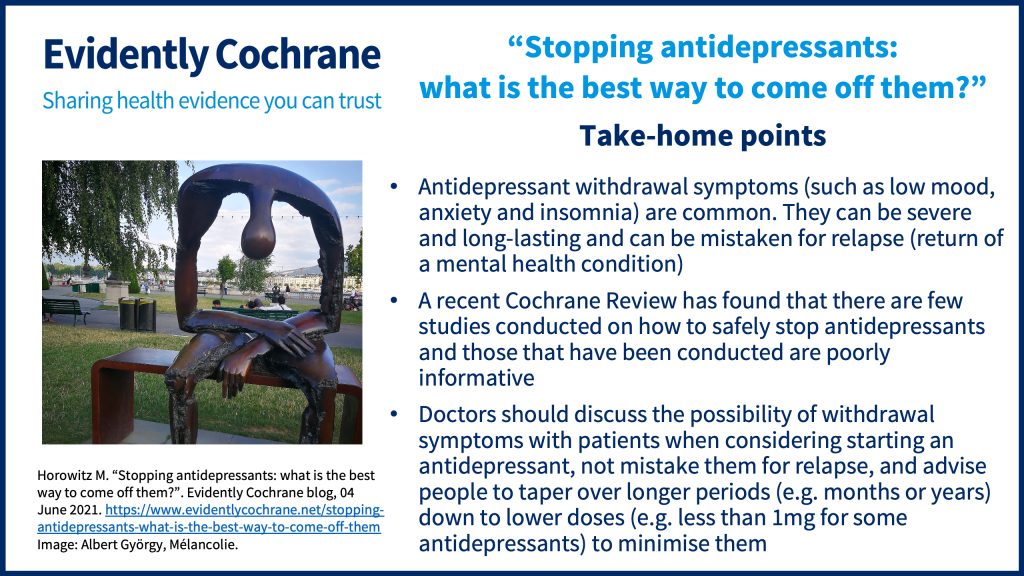In this blog for patients and doctors, Dr Mark Horowitz, training psychiatrist and Clinical Research Fellow at University College London, looks at the latest Cochrane evidenceCochrane Reviews are systematic reviews. In systematic reviews we search for and summarize studies that answer a specific research question (e.g. is paracetamol effective and safe for treating back pain?). The studies are identified, assessed, and summarized by using a systematic and predefined approach. They inform recommendations for healthcare and research. on how to safely stop antidepressants and explores the implications for patients and doctors having to navigate this area so neglected by medical researchers. Mark’s personal experience of the difficulty in coming off antidepressants led to an interest in the little-understood field of stopping psychiatric medication, and the balance of harms and benefits.
Featured Image: Albert György, Mélancolie*
Page last checked 3 July 2023
Take-home points

Although I had completed a PhD in the effect of antidepressants on the brain at the world’s leading psychiatric research centre, when it came to stopping an antidepressant for myself I had little idea how to do so. In medical school and psychiatry training, I had never been given a lecture on this topic. In scouring through the medical literature, the only guidance I found recommended stopping antidepressants over 2-4 weeks and to expect withdrawal symptoms (called ‘discontinuation symptoms’ by the drugs’ manufacturers) to be ‘mild and short-lived’.
Like tens of thousands of people around the world, I found this advice to be disastrous and it led to horrendous withdrawal symptoms – profound insomnia, dizziness, and panic attacks, none of which I had experienced before coming off antidepressants. I had hoped to find good quality guidance on how to avoid this awful experience. Unfortunately, instead of applying their expertise to the problems people have coming off antidepressants, many of the expert psychopharmacologists funded by industry around the world have ignored the problem of withdrawal or even ridiculed patients as malingering or being motivated by financial gain.
Looking for evidence on how to safely stop antidepressants
I was therefore delighted to be involved in a recent Cochrane ReviewCochrane Reviews are systematic reviews. In systematic reviews we search for and summarize studies that answer a specific research question (e.g. is paracetamol effective and safe for treating back pain?). The studies are identified, assessed, and summarized by using a systematic and predefined approach. They inform recommendations for healthcare and research. on the topic of how to safely stop antidepressants, entitled Approaches for discontinuation versus continuation of long‐term antidepressant use for depressive and anxiety disorders in adults with lead author Ellen van Leuween from Belgium.
One of the main findings of the review was how little attention has been given to the issue of stopping antidepressants: we found only 33 randomisedRandomization is the process of randomly dividing into groups the people taking part in a trial. One group (the intervention group) will be given the intervention being tested (for example a drug, surgery, or exercise) and compared with a group which does not receive the intervention (the control group). controlled trialsA trial in which a group (the ‘intervention group’) is given a intervention being tested (for example a drug, surgery, or exercise) is compared with a group which does not receive the intervention (the ‘control group’). (RCTs). Given that antidepressants are used by up to one in six adults in developed countries and there are hundreds of RCTs on starting antidepressants (some estimate there are more than a thousand, because many of these studies go unpublished), this is rather astounding. It is likely that this profound imbalance reflects the interest of the drug companies who have funded the vast majority of these studies – their commercial interests are served by starting, not stopping antidepressants, especially if stopping proves difficult, or even disastrous, as it can be for some people.
Even the 33 studies that were conducted were not helpful for answering the question of how best to stop antidepressants. Most of them were studies designed to assess whether antidepressants prevented relapse (return of the underlying condition) when they were stopped, and so measured relapse rather than how successful stopping was. Most of them stopped the drugs very quickly – 13 studies stopped them abruptly (in one day) and the rest stopped them in less than 4 weeks. Even the NICE guidelines, which have been criticised for the rapidity of its advice on how to stop, recommends stopping over at least four weeks. The Royal College of Psychiatrists has recently published guidance on stopping antidepressants which recommends stopping them over months or years. Therefore the studies captured by this review stopped antidepressants very quickly by comparison with current consensus guidance.
Withdrawal symptoms from antidepressants can be mistaken for relapse (return) of an underlying condition
Perhaps most significantly, only one of the 33 studies we found measured withdrawal symptoms, recognised as one of the main barriers to being able to easily stop antidepressants. This is probably the major flaw of the existing studies. Withdrawal symptoms from antidepressants can include low mood, anxiety, and trouble sleeping (these even occur in people who are coming off antidepressants which were prescribed for reasons other than mental health problems, such as for pain). In the discontinuation (stopping) studies we looked at, relapse is detected using questionnaires that ask participants about their mood, anxiety and sleep, and so withdrawal symptoms that fall into these categories will contribute to people being diagnosed with relapse, unless they are specifically measured separately.
This is a major problem with such studies as it may make it look like antidepressants are more effective at preventing a return of a mental health condition than they really are. This would be like looking at people giving up caffeine and concluding that because they get anxious or irritable when they stop they should continue drinking coffee to prevent anxiety. This erroneous conclusion is often reached when it comes to antidepressants. Many patients who go to their doctor to report withdrawal symptoms from their antidepressants are told that they have actually relapsed (we are currently performing a studyAn investigation of a healthcare problem. There are different types of studies used to answer research questions, for example randomised controlled trials or observational studies. on this topic).
Although this misdiagnosis from doctors can lead to harm (inadequate management of withdrawal symptoms and erroneous conclusions that the patient needs the drug lifelong) it is understandable because for so many years official guidance has described antidepressant withdrawal symptoms as “mild and self-limiting.” When patients present with severe, and long-lasting symptoms, doctors simply cannot reconcile this presentation with what they have been taught about withdrawal.
Antidepressant withdrawal symptoms: increasing recognition that they are common, can be severe and long-lasting
Recent studies have now made it clear that antidepressant withdrawal is very common – perhaps up to half of people who antidepressants will experience it, with increased likelihood the longer you are on medication. It can be severe for a portion of people – and the chance of it being severe also seems to increase the longer you are on the drug – but the exact proportion is not known because there has been so little study in this area. We also know that for some people it can last for months and years, and can be debilitating, leading to loss of jobs, failure of relationships and the symptoms can be so intolerable that they lead people to suicide.
Now that there is increasing understanding that antidepressant withdrawal symptoms are common, can be long-lasting and severe, we would hope that both patients and doctors will become better at spotting this diagnosis. Both the NICE guidelines in the UK and the guidance from the Royal College of Psychiatrists (RCPsych) have been updated to inform doctors that antidepressant withdrawal can be “severe and long-lasting.” However, we also know that there can be a long lag period between updating expert guidance and this trickling down to everyday practice.
One of the consequences of this lack of expertise amongst doctors is that patients, finding that their doctors are not aware of withdrawal symptoms and do not know how to help them safely come off their antidepressants, turn to online peer support groups like The Withdrawal Project or Surviving Antidepressants, or to dozens of Facebook groups where patients have been forced through necessity to develop guidelines of their own for how to get off antidepressants. Despite having a medical degree, training in psychiatry and a PhD on the topic of antidepressants, it was from these websites that I learnt how to safely come off my antidepressant. In fact, the recent guidance from the RCPsych was greatly influenced by information from these websites.
Distinguishing withdrawal symptoms from relapse
Hopefully, in the coming years, doctors (and patients) will get better at distinguishing withdrawal symptoms from relapse.
In addition to low mood, anxiety and trouble sleeping which could occur in both conditions, withdrawal from antidepressants also includes a wide range of symptoms that mark them out as distinctive – including dizziness, electric shock (or ‘zap’) sensations in the head or limbs, muscle twitching, trouble concentrating (sometimes called ‘brain fog’), a feeling of not being real (depersonalisation), and a host of others. Other clues that symptoms are due to withdrawal and not relapse are that they come on soon after reducing or stopping a dose – some antidepressants like fluoxetine, take longer to leave the body and so can cause delayed withdrawal symptoms – whereas relapses do not come on so quickly.
Withdrawal symptoms tend to resolve themselves over time, especially if dose reductions are small enough. Re-starting an antidepressant tends to improve withdrawal symptoms over days (especially if the drug has not been stopped for too long), much quicker than a relapse might take to respond. Withdrawal symptoms tend to involve symptoms that are different from the person’s underlying condition (patients will often say ‘this is nothing like my original condition.’)

So how can people come off antidepressants safely?
The first thing for patients and doctors to understand is that withdrawal symptoms are not a sign of relapse and therefore not a sign that a patient needs an antidepressant: instead it is a sign that the patient needs to taper off their antidepressant more slowly (as it would be for caffeine or benzodiazepines (commonly used to treat alcohol withdrawal or for short-term (2-4 week) management of anxiety)) or any other substance that causes physical dependence and withdrawal).
We now appreciate that for patients who take antidepressants for more than a few weeks, it will take some of them several months to come off and others will take years, in order to make withdrawal symptoms tolerable.
Brain imaging of people on antidepressants shows that even very small doses (such as one-fortieth of the usual doses of antidepressants or as little as 1mg) of antidepressants have significant effects on the brain. This is because the relationship between dose of an antidepressant and effect on the brain is not linear but is rather hyperbolic – whereby the effect on the brain increases steeply for small doses before levelling out at higher doses.
This means that the dose of antidepressant should be decreased by smaller and smaller amounts as total dosage gets lower to prevent increasing withdrawal symptoms, as outlined in the recent RCPsych guidance. If people experience unpleasant withdrawal symptoms they should either hold their dose for a period until it passes or increase their dose to the last dose at which they were stable before trying to reduce again at a more gradual rateThe speed or frequency of occurrence of an event, usually expressed with respect to time. For instance, a mortality rate might be the number of deaths per year, per 100,000 people. (i.e. smaller dose reductions and/or greater time periods between doses) after stabilising.
Many patients find that they cannot reduce faster than 10% of the most recent dose per month (so that the dose reductions become smaller and smaller each month) and for some people this will take years. The best guide as to the rate at which someone should reduce is the rate that feels comfortable for them – imposing reduction schedules can lead to severe withdrawal symptoms.
One of the practical issues in reducing antidepressants is the need to achieve small doses to make the reduction tolerable – to do this will require the use of tablet cutters to split tablets, and using liquid preparations of antidepressants (from either liquid versions made by manufacturers or dispersible forms of tablets). In some cases, this will involve diluting existing solutions further – pharmacists and GPs will be very helpful in these cases. There are also small doses of tablets made by a not for profit pharmacy in Holland called ‘tapering strips.’
Where does this leave us?
Doctors will need to become more familiar with diagnosing withdrawal symptoms and advising patients how to safely taper off their antidepressants. When doctors are discussing antidepressants as a treatmentSomething done with the aim of improving health or relieving suffering. For example, medicines, surgery, psychological and physical therapies, diet and exercise changes. option they should also be routinely informing patients of the riskA way of expressing the chance of an event taking place, expressed as the number of events divided by the total number of observations or people. It can be stated as ‘the chance of falling were one in four’ (1/4 = 25%). This measure is good no matter the incidence of events i.e. common or infrequent. of experiencing potentially severe and long-lasting withdrawal symptoms, as well as what can be done to reduce this risk. They should also outline the numerous options that are alternatives to medication which may be equally or more effective.
Researchers will need to conduct more informative studies on how to safely stop antidepressants, including studies that reduce doses slowly and down to very low final doses, and carefully measure withdrawal symptoms. They will also need to re-examine the current evidence base we have for recommending long-term treatment with antidepressants. This is based on the sort of discontinuation studies outlined in the review, which are problematic because they do not measure withdrawal symptoms and so may overestimate the risk of relapse on stopping. We need more careful trialsClinical trials are research studies involving people who use healthcare services. They often compare a new or different treatment with the best treatment currently available. This is to test whether the new or different treatment is safe, effective and any better than what is currently used. No matter how promising a new treatment may appear during tests in a laboratory, it must go through clinical trials before its benefits and risks can really be known. to evaluate whether there is benefit to continuing antidepressants in the long run as the current evidence for this is unreliable.
As a society we need to ask ourselves how we have come to this problem again – after having similar issues with benzodiazepines (in which it similarly took authorities decades to recognise the withdrawal effects reported by patients), opioids, and now with gabapentinoids (commonly used to treat pain and anxiety). Doctors need to listen to patients when they report problems and believe them.
We also need to ask questions about why we continue to allow academics compromised by payments from drug companies to publish misleading papers and influence guidelines that further commercial interests and not patient welfare: this has led to the current circumstance where there are tens of millions of people around the world on a drug class that can be difficult to stop at significant cost to health systems, as well as causing huge personal suffering for many patients.
I hope that further work in this area will prevent people having to go through the awful process I endured and having to seek information from internet forums rather than from their doctors. This should be a clarion call to the next generation of doctors and researchers to flock to this area of research with so much potential to improve the lives of so many people.
Preparing to discuss treatment options with your healthcare provider:
- How long do I need to be on antidepressants?
- What is the evidence for this?
- How common, severe and long-lasting are withdrawal symptoms?
- What is the best way to stop antidepressants? How slowly should I be reducing my medication? How small are the reductions I need to make? How can this be managed practically given existing formulations of antidepressants?
- Are there other treatment options I could consider and how do the risks and benefits compare?
Mark Horowitz has nothing to disclose.
*Featured Image: “Albert György, Mélancolie” by art_inthecity is licensed under CC BY 2.0.
**Illustrations by Annina Diston. From left to right: ‘Hold me tighter’, ‘Blanket shell’, ‘Never forget my rucksack’. The images were developed by Cochrane Common Mental Disorders to support the dissemination of their reviews in partnership with graphic designer Annina Diston and with input by people with lived experience.



Please please help me… after looking after my elderly parents in lockdown with Alzheimer’s and strokes etc I am feeling in desperate need of help as I am severely depressed. I have been put on and taken off quickly several antidepressants in the last nine months of pure hell. None helped and I experienced extreme nausea. I have been hospitalised for three weeks and came out no better. I have sent this article to my doctor. I was on a small dose of
Citalopram and a small dose of clonazepam for twenty years and well before the death of my father and my illness began. I am now on Mirtazapine that is not working, pregabalin and a lot of clonazepam and have been trying to get off the zopoclone I was given in hospital. I am desperate. I don’t know how to get the reduction strips needed. I would be very grateful for your reply and any help you can give me. Thank you so very much.
Dear Nichola, I’m very sorry but we are not able to offer any clinical advice. I just wanted to reply to send you our very best wishes – we hope that you get the support and care you need from your GP, and that the information in this blog may help a little. Take care, Selena [Editor]
I was on SSRIs for over 30 years. My Dr told me to wean off in only 9 weeks. It’s been 2 years off of pure torture.
Congratulations on your article! It has been so refreshing and such a relief to find someone actually taking this issue seriously!. I am so sorry for your suffering and long journey too; I too have been taking an ssri for many years (15yrs – albeit only 6mgs) I was originally prescribed it for pms and as a migraine prophylaxis and have suffered greatly when trying to discontinue, not helped by various professionals knowing very little about this field. Like you I only found support in online groups. I am 62 now and have worked as a researcher for the Mental Health Foundation based at St George’s University Hospital Medical school, as a student therapist at London University and in primary care in the nhs. For the past 17 years I have worked as an honorary support capacity at a systemic family and couples therapy clinic at Springfield university hospital. I still continue on with my work here one day a week. If you need an extra subject for any research regarding any aspect of this, I am here ! Also if you happen to know of a London psychiatrist or anyone who is sympathetic to withdrawal issues who would be happy to talk to me about this I would be so grateful. Many thanks.